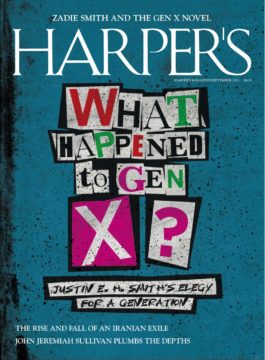Justin E. H. Smith at Harper’s:
 I recall having breakfast at a hotel in Brussels in 2017 and sitting across from Douglas Coupland, the author of Generation X: Tales for an Accelerated Culture, the 1991 book that gave my generation a sort of name that was really only a placeholder for a name. I wanted to tell him how much I resented him for this, but I couldn’t muster the courage to be disagreeable.
I recall having breakfast at a hotel in Brussels in 2017 and sitting across from Douglas Coupland, the author of Generation X: Tales for an Accelerated Culture, the 1991 book that gave my generation a sort of name that was really only a placeholder for a name. I wanted to tell him how much I resented him for this, but I couldn’t muster the courage to be disagreeable.
At the time it was my firm belief that generations did not exist, that they were simply a retroactive periodization that imposed narrative cohesion on history, one which had really no more legitimacy than such contested categories as “the Dark Ages” or “postmodernity.” “Generation,” of course, means primarily sexual generation—think, for example, of Aristotle’s treatise On the Generation of Animals—and for a long time I bristled at the thought that my own individual generation, in Aristotle’s sense, could also, at the same time, be part of a vastly larger collective generation: the coming-into-being of millions of us at once, or in roughly the same period, millions who, as coevals, share much of the same nature and the same fate. This felt like an echo of astrology. What do I, who am sui generis (note here the reappearance of the Latin root in question), have to do with those who were born in approximately the same epoch?
More here.
